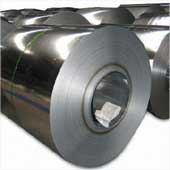Tata Steel Limited, the world's 10th largest steel company and a subsidiary of Tata Steel Group, will increase investment in China by 5 per cent in 2012 as it seeks to maintain market share, managing director Hemant Madhusudan Nerurkar said. Chinese steel industry has developed very well in the last 10 years at an "admirable" speed and he expects the company's business in China to grow at the same rate as the country's steel consumption growth, by 5 to 7 per cent year-on-year, Nerurkar told the official China Daily.
Chinese steel industry has developed very well in the last 10 years at an "admirable" speed and he expects the company's business in China to grow at the same rate as the country's steel consumption growth, by 5 to 7 per cent year-on-year, Nerurkar told the official China Daily.
Revenue from China contributed no more than 3 to 4 per cent to the company's total revenue in the latest fiscal, he said.
Apart from local demand, Tata Steel also expects to export more products from its Chinese mills to Europe and Japan, both markets that require external supplies, he said.
At present, the company isn't considering entering into partnerships with Chinese steel players, Nerurkar said, adding that it has not ruled out the possibility of developing downstream partnerships at some point in the future.
"Possible cooperation with Chinese companies also involves issues such as energy conservation, climate change and some energy-saving products," he said.
The company will not make any major investments in its rolling mills, located in the cities of Wuxi in Jiangsu province and Xiaman in Fujian province, this year, "but next year there will be some changes," he said.
Currently, the company's problem in China is overcapacity, which means production far exceeds real demand, but capacity will gradually decline as the government encourages more energy efficiency in industry.
"Infrastructure investment in China is still very high, and there is still great demand for steel. As Chinese industry becomes more and more self -sufficient in raw materials, I'm sure it will turn out well," he said.
Meanwhile, rising demand for more value-added products, such as coated steels, electrical steels and products for the aviation industry will provide opportunities for the company, he said.
In December, 2006, a subsidiary, Tata Refractory, opened a factory in Yingkou, a city in Northeast China's Liaoning province.
Later, Corus Ltd, later renamed Tata Steel Europe, was acquired in early 2007.
It also has a trading business in China.
Nerurkar said Tata Steel will continue to look for coking coal and iron ore assets for acquisition in areas such as Africa, Canada and Brazil to secure raw materials and counter fluctuating prices for coal and iron.
The industry is facing severe price fluctuations and 70 per cent of costs come from iron ore purchases, Nerurkar said.
He suggested that iron ore suppliers and steel companies return to an annual pricing mechanism to avoid frequent price fluctuation for raw materials based on quarterly negotiations between the two sides.
In common with the rest of the steel industry, raw material prices will inevitably affect Tata Steel's profitability, Nerurkar said.







 © 2025
© 2025